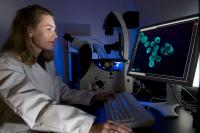Mar 30 2010
Marissa Nichole Rylander, Wake Forest University School of Biomedical Engineering and Sciences’ (SBES) Virginia Tech assistant professor, who was jointly appointed in the Department of Mechanical Engineering and Virginia Tech, has received the National Science Foundation (NSF) Faculty Early Career Development (CAREER) award.
 Dr. Marissa Nichole Rylander, Virginia Tech Assistant Professor
Dr. Marissa Nichole Rylander, Virginia Tech Assistant Professor
This award is for conducting initial research related to cancer treatments utilizing laser therapy and nanotechnology.
Rylander will further develop and use a unique novel sensing system with help from the CAREER award. The sensing system, known as the ‘holey scaffold,’ was co-invented by Rylander. Rylander’s design will enable the characterization of a nanoparticle’s time-based, three-dimensional motion. This nanoparticle is utilized for a treatment process. Her design will also depict the light-activated dynamic terminal, as well as the tumor’s chemical response to the laser therapy that is nanoparticle-mediated. The response of the tumor can be ascertained for a range of laser characteristics and nanoparticle properties for both in vivo and in vitro systems.
Rylander’s holey scaffold is the original system that is able to sense at the molecular level, and also control transport and biological processes inside living organisms, using a non-destructive and minimally invasive process. She revealed that the scaffold can be considered as a minute microscope that is utilized with a living system. This scaffold is created out of tissue scaffolding and is incorporated inside a hollow microchannel network. It is usually made using biological materials or biodegradable synthetics like collagen. The scaffold can also facilitate growth of the tissue.
These microchannels can also be utilized for performing delivery of biological agents in a controlled manner. These agents are in therapeutic, tumor cells, nutrients, or nanoparticle forms. Other microchannels are also available for introducing fibers of micron size for conducting in situ, non-destructive imaging in real-time for therapeutic light delivery or biological processes.
In 2006 Rylander joined the faculty of Virginia Tech and was awarded a doctorate by the Austin-based University of Texas (UT) in biomedical engineering during 2005. She continued as a postdoctoral fellow and was appointed jointly in the Institute for Computational Engineering and Sciences and the biomedical engineering department.
Her receipt of the CAREER award partly is for continuation of her activities at the UT relating to description of injury and heat shock protein (HSP) expression present in tumors and prostate cancer cells in response to increased temperatures in laser heating and water heating situations. Tumor regions having a high probability of recurrence and survival can be identified by understanding the distribution of HSP in tumors. Hence, the optimization of HSP expression for improved outcome of treatment is possible by modifying therapeutic procedures.
Rylander created innovative novel computational treatment planning models for predicting the HSP expression and temperature based on her experimental results. In addition, this model can also predict tissue and cellular level injury due to laser therapy. Her aim is to use the award to finally create more selective and effective laser-based therapies by utilizing nanoparticles for enhancing laser-oriented chemical and thermal treatments.
Her scaffold design will help her to measure reactive oxygen species (ROS) creation, nanoparticle mass transport, HSP expression, cell viability, and temperature on real-time basis. These measurements are possible inside an in vivo tumor in a mouse or an in vitro tumor inside a bioreactor. Rylander will utilize a range of nanoparticles like carbon nanohorns combined with laser irradiation, novel embodiments of fullerenes and carbon nanotubes, and carbon nanotubes.
She hopes to produce multi-component based treatment planning computational model by studying the response of the tumor to varying laser parameters, delivery methods, and nanoparticle types. Clinicians will be able to use this model for applications related to nanoparticle-medicated laser therapy for the determination of appropriate laser parameters and nanoparticle properties for enabling effective and selective treatment of cancer.
The award will also enable her to develop a nanotherapeutics course for graduate and undergraduate students. She will also be able to further study nanoparticles’ basics. The basics relate to measure interactions of nanoparticles with nanotherapy’s photochemical mechanisms, photothermal, and biological tissues during her experiments.
A multi-tier-based education and outreach plan can be created by the CAREER project for integrating multidisciplinary research and educational experiences for teachers and high school students in West Virginia-based underprivileged schools, as well as for graduate students and undergraduates at Virginia Tech.
Rylander revealed that her career goal for the long term is developing selective and effective cancer therapies that are nanotechnology based and can be implemented readily as a viable option for treating many cancer patients.